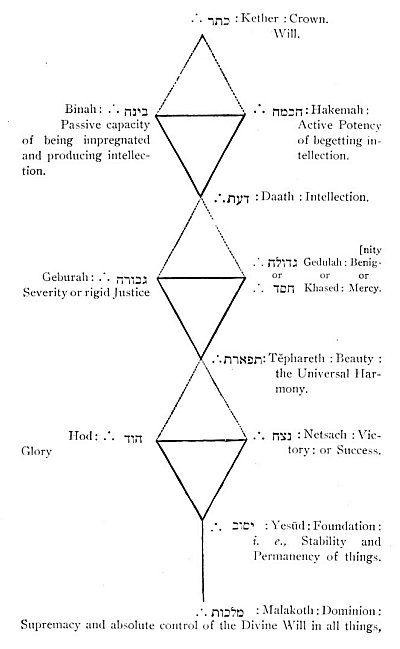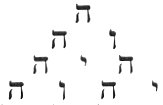For the union of Nature with herself is a chaste marriage, of which the union of man and woman was a natural image, and their organs were an expressive emblem of the double energy which manifests itself in Heaven and Earth uniting together to produce all beings. “The Heavens,” says Plutarch, “seemed to men to fulfill the functions of father, and the Earth of mother. The former impregnated the earth with its fertilizing rains, and the earth, receiving them, became fruitful and brought forth.” Heaven, which covers and embraces the earth everywhere, is her potent spouse, uniting himself to her to make her fruitful, without which she would languish in everlasting sterility, buried in the shades of chaos and of night. Their union is their marriage; their productions or parts are their children. The skies are our Father, and Nature the great Mother of us all.
p. 657
This idea was not the dogma of a single sect, but the general opinion of all the Sages. “Nature was divided,” says Cicero, ‘”into two parts, one active, and the other that submitted itself to this action, which it received, and which modified it. The former was deemed to be a Force, and the latter the material on which that Force exerted itself.” Macrobius repeated almost literally the doctrine of Ocellus. Aristotle termed the earth the fruitful mother, environed on all sides by the air. Above it was Heaven, the dwelling-place of the gods and the divine stars, its substance ether, or a fire incessantly moving in circles, divine and incorruptible, and subject to no change. Below it, nature, and the elements, imitable and acted on, corruptible and mortal.
Synesius said that generations were effected in the portions of the Universe which we inhabit; while the cause of generations resided in the portions above us, whence descend to us the germs of the effects produced here below. Proclus and Simplicius deemed Heaven the Active Cause and Father, relatively to the earth. The former says that the World or the Whole is a single Animal; what is done in it, is done by it; the same World acts, and acts upon itself. He divides it into “Heaven” and “Generation.” In the former, he says, are placed and arranged the conservative causes of generation, superintended by the Genii and Gods. The Earth, or Rhea, associated ever with Saturn in production, is mother of the effects of which Heaven is Father; the womb or bosom that receives the fertilizing energy of the God that engenders ages. The great work of generation is operated, he says, primarily by the action of the Sun, and secondarily by that of the Moon, so that the Sun is the primitive source of this energy, as father and chief of the male gods that form his court. He follows the action of the male and female principles through all the portions and divisions of nature, attributing to the former the origin of stability and identity, to the latter, that of diversity and mobility. Heaven is to the earth, he says, as the male to the female. It is the movement of the heavens that, by their revolutions, furnished the seminal incitements and forces, whose emanations received by the earth, make it fruitful, and cause it to produce animals and plants of every kind.
Philo says that Moses recognized this doctrine of two causes, active and passive; but made the former to reside in the Mind or Intelligence external to matter.
p. 658
The ancient astrologers divided the twelve signs of the Zodiac into six male and six female, and assigned them to six male and six female Great Gods. Heaven and Earth, or Ouranos and Ghê, were among most ancient nations, the first and most ancient Divinities. We find them in the Phœnician history of Sanchoniathon, and in the Grecian Genealogy of the Gods given by Hesiod. Everywhere they marry, and by their union produce the later Gods. “In the beginning,” says Apollodorus, “Ouranos or the Heavens was Lord of all the Universe: he took to wife Ghê or the earth, and had by her many children.” They were the first Gods of the Cretans, and under other names, of the Armenians, as we learn from Berosus, and of Panchaîa, an island South of Arabia, as we learn from Euhemerus. Orpheus made the Divinity, or the “Great Whole,” male and female, because, he said, it could produce nothing, unless it united in itself the productive force of both sexes. He called Heaven PANGENETOR, the Father of all things, most ancient of Beings, beginning and end of all, containing in Himself the incorruptible and unwearying force of Necessity.

Moe is the founder of GnosticWarrior.com. He is a father, husband, author, martial arts black belt, and an expert in Gnosticism, the occult, and esotericism.






